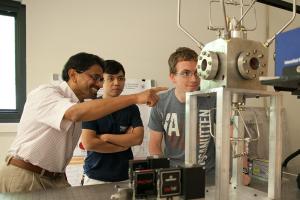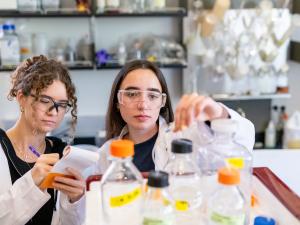Mechanical Engineering Undergraduate Program

Mechanical engineering is one of the largest, broadest, and oldest engineering disciplines. Mechanical engineers use the principles of energy, materials, and mechanics to design, analyze, optimize, and manufacture machines and devices of all types. They create the processes and systems that drive technology and industry. The key characteristics of the profession are its breadth, flexibility, and individuality. The career paths of mechanical engineers are largely determined by individual choices, a decided advantage in a changing world.
Our Program
-
B.S. in Mechanical Engineering
Discover the curriculum and requirements for the bachelor of science in mechanical engineering.
Resources for Current Students
-
Student Support
As an undergraduate student at UVA Engineering, you have access to an array of student support services including peer-to-peer tutoring, professional academic coaching, access to mental health support, and dedicated advising.
-
Academic Advising
Every student has an advisor in the Engineering School. While there are many resources for support at the University, we encourage students to advocate for themselves to the best of their ability and seek out support early and often.
-
Student Life
Discover more about student life at UVA and in Charlottesville.
Get In Touch
Please reach out to us at MAEoffice@virginia.edu with any questions, concerns, inquiries, etc.

Baoxing Xu
Dr. Xu joined the Department of Mechanical and Aerospace Engineering at The University of Virginia in the fall of 2014. He received his PhD in Mechanics and Materials from Columbia University in 2012 and was a Beckman Postdoctoral Fellow at the University of Illinois at Urbana-Champaign from 2012 to 2014.

Undergraduate Research
Undergraduate researchers are mentored by faculty and work closely with the lab’s graduate students and post-doctoral fellows. They are valued lab members, attending lab meetings and participating in journal clubs. They co-author publications, present at national meetings, and fund their own research through competitive awards.
Quick Links
Accreditation
Aerospace Engineering and Mechanical Engineering Bachelor’s of Science degrees are accredited by the Engineering Accreditation Commission of ABET / https://www.abet.org.
PROGRAM ENROLLMENT AND GRADUATION INFORMATION is maintained by the UVA School of Engineering and Applied Science.
Upon completion of the mechanical or aerospace engineering curriculum, students will have:
- An ability to identify, formulate, and solve complex engineering problems by applying principles of engineering, science, and mathematics
- An ability to apply engineering design to produce solutions that meet specified needs with consideration of public health, safety, and welfare, as well as global, cultural, social, environmental, and economic factors
- An ability to communicate effectively with a range of audiences
- An ability to recognize ethical and professional responsibilities in engineering situations and make informed judgments, which must consider the impact of engineering solutions in global, economic, environmental, and social contexts
- An ability to function effectively on a team whose members together provide leadership, create a collaborative and inclusive environment, establish goals, plan tasks, and meet objectives
- An ability to develop and conduct appropriate experimentation, analyze and interpret data, and use engineering judgment to draw conclusions
- An ability to acquire and apply new knowledge as needed, using appropriate learning strategies
The Program Educational Objectives for both Undergraduate Programs in Mechanical and Aerospace Engineering reflect not only the breadth and technical skills expected of each discipline, but the Jeffersonian principles of free inquiry, ethical conduct, creativity, and continuous personal growth that form the backbone of the University of Virginia.
- Graduates of the Mechanical Engineering program at the University of Virginia have the knowledge, skills and professional character that will allow them to make tangible contributions, meet new technical challenges, contribute effectively as team members, leaders, and innovators in the analysis, design, and implementation of solutions to a broad range of problems with mechanical devices and systems. They communicate effectively and interact responsibly with colleagues, clients, employers, and society.
- Graduates of the Aerospace Engineering program at the University of Virginia have the knowledge, skills and professional character that will allow them to make tangible contributions, meet new technical challenges, contribute effectively as team members, leaders, and be innovators in the analysis, design, and implementation of solutions to a broad range of problems with aerospace vehicle systems. They communicate effectively and interact responsibly with colleagues, clients, employers, and society.
Upcoming Events
See All Events-
Time: 3:30 PM - 4:30 PMLocation: Olsson 001
-
The information contained on this website is for informational purposes only. The Undergraduate Record and Graduate Record represent the official repository for academic program requirements. These publications may be found here.
